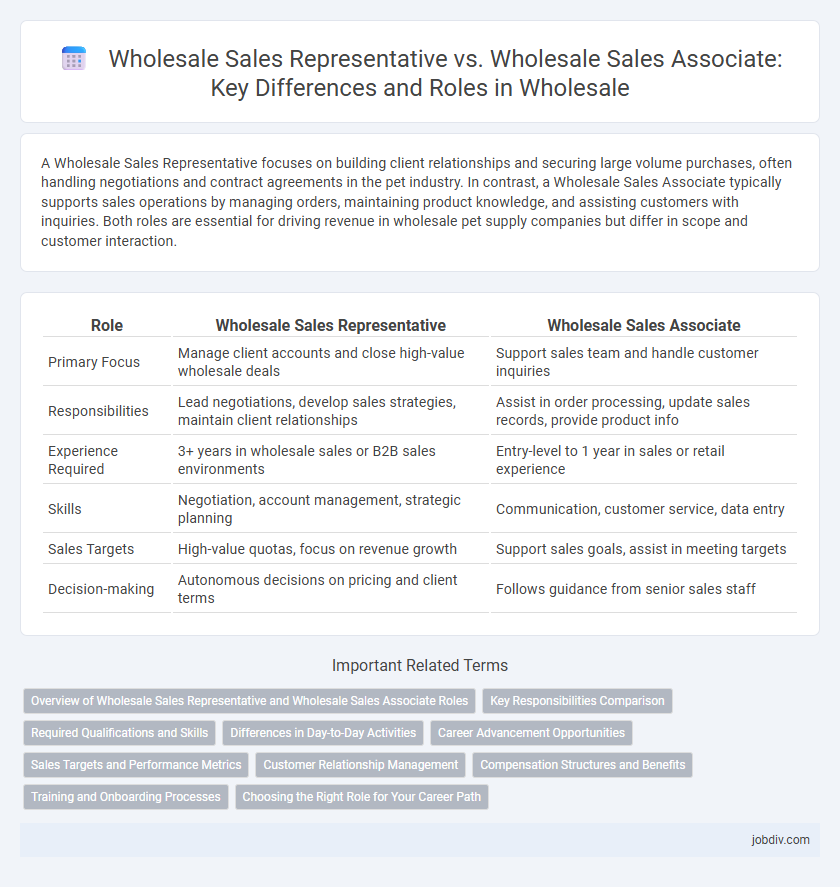A Wholesale Sales Representative focuses on building client relationships and securing large volume purchases, often handling negotiations and contract agreements in the pet industry. In contrast, a Wholesale Sales Associate typically supports sales operations by managing orders, maintaining product knowledge, and assisting customers with inquiries. Both roles are essential for driving revenue in wholesale pet supply companies but differ in scope and customer interaction.
Table of Comparison
| Role | Wholesale Sales Representative | Wholesale Sales Associate |
|---|---|---|
| Primary Focus | Manage client accounts and close high-value wholesale deals | Support sales team and handle customer inquiries |
| Responsibilities | Lead negotiations, develop sales strategies, maintain client relationships | Assist in order processing, update sales records, provide product info |
| Experience Required | 3+ years in wholesale sales or B2B sales environments | Entry-level to 1 year in sales or retail experience |
| Skills | Negotiation, account management, strategic planning | Communication, customer service, data entry |
| Sales Targets | High-value quotas, focus on revenue growth | Support sales goals, assist in meeting targets |
| Decision-making | Autonomous decisions on pricing and client terms | Follows guidance from senior sales staff |
Overview of Wholesale Sales Representative and Wholesale Sales Associate Roles
Wholesale Sales Representatives focus on building client relationships, presenting products, and negotiating contracts to drive bulk sales. Wholesale Sales Associates support these efforts by managing inventory, assisting customers, and maintaining sales records in retail or warehouse settings. Both roles require strong communication skills but differ in direct sales involvement and operational tasks.
Key Responsibilities Comparison
Wholesale Sales Representatives focus on generating new accounts, negotiating contracts, and maintaining relationships with key clients to drive sales volume. Wholesale Sales Associates primarily support customer service, manage inventory, and assist in processing orders within established accounts. Both roles require product knowledge and strong communication skills but differ in their emphasis on client acquisition versus operational support.
Required Qualifications and Skills
Wholesale Sales Representatives typically require strong negotiation skills, in-depth product knowledge, and the ability to manage client relationships to secure large-volume transactions. Wholesale Sales Associates often focus on customer service, inventory management, and effective communication skills to support day-to-day sales operations and assist clients. Both roles prioritize proficiency in sales software, understanding market trends, and maintaining professionalism in B2B interactions.
Differences in Day-to-Day Activities
Wholesale Sales Representatives focus primarily on acquiring new clients and negotiating large contracts, often traveling to meet potential buyers and attending trade shows. Wholesale Sales Associates handle customer service, process orders, and maintain inventory records within the warehouse or store setting. The Representative's role emphasizes business development and sales strategy, while the Associate concentrates on order fulfillment and client support.
Career Advancement Opportunities
Wholesale Sales Representatives often have greater career advancement opportunities due to their focus on managing client relationships and negotiating large contracts, leading to roles in sales management or business development. Wholesale Sales Associates typically support sales operations and gain experience in customer service, which can serve as a foundation for moving into representative positions. Progression in wholesale sales careers depends on gaining product knowledge, sales skills, and proven performance in meeting or exceeding sales targets.
Sales Targets and Performance Metrics
Wholesale Sales Representatives are typically responsible for meeting aggressive sales targets by developing new client relationships and expanding market presence, with performance metrics centered around revenue growth and client acquisition rates. Wholesale Sales Associates focus more on supporting sales activities, managing customer inquiries, and maintaining existing accounts, with performance evaluated based on customer satisfaction and order accuracy. Both roles contribute to overall sales performance, but representatives have a direct impact on achieving strategic sales goals while associates ensure smooth transaction processes.
Customer Relationship Management
Wholesale Sales Representatives focus on building long-term customer relationships by identifying client needs and providing tailored solutions to drive repeat business. Wholesale Sales Associates support these efforts by maintaining detailed customer records, managing order processing, and assisting with follow-up communications to ensure client satisfaction. Both roles rely heavily on effective Customer Relationship Management (CRM) tools to track interactions, analyze sales data, and enhance the overall customer experience in the wholesale market.
Compensation Structures and Benefits
Wholesale Sales Representatives typically earn higher base salaries combined with performance-based commissions, reflecting their role in securing large accounts and driving revenue growth. Wholesale Sales Associates often receive hourly wages or lower fixed salaries with fewer or no commission incentives, as their duties emphasize customer service and order processing. Benefits for Representatives may include bonuses, stock options, and travel reimbursements, whereas Associates usually access standard benefits such as health insurance and retirement plans.
Training and Onboarding Processes
Wholesale Sales Representatives undergo extensive product knowledge and market strategy training to effectively engage clients and close deals, while Wholesale Sales Associates typically receive foundational training focused on customer service and inventory management. Onboarding for Sales Representatives includes role-specific sales techniques and performance metrics, whereas Associates' onboarding emphasizes operational procedures and team support functions. Both roles require ongoing training, but the complexity and depth of training align with their distinct responsibilities in the wholesale sales cycle.
Choosing the Right Role for Your Career Path
Wholesale Sales Representatives focus on building client relationships and closing deals, often managing key accounts and negotiating contracts, which suits individuals aiming for strategic roles in sales management. Wholesale Sales Associates typically handle day-to-day sales operations, customer service, and product presentations, ideal for those seeking hands-on experience and entry-level positions in wholesale. Evaluating your career goals, whether targeting leadership or operational expertise, helps determine the best fit between these roles.
Wholesale Sales Representative vs Wholesale Sales Associate Infographic

 jobdiv.com
jobdiv.com